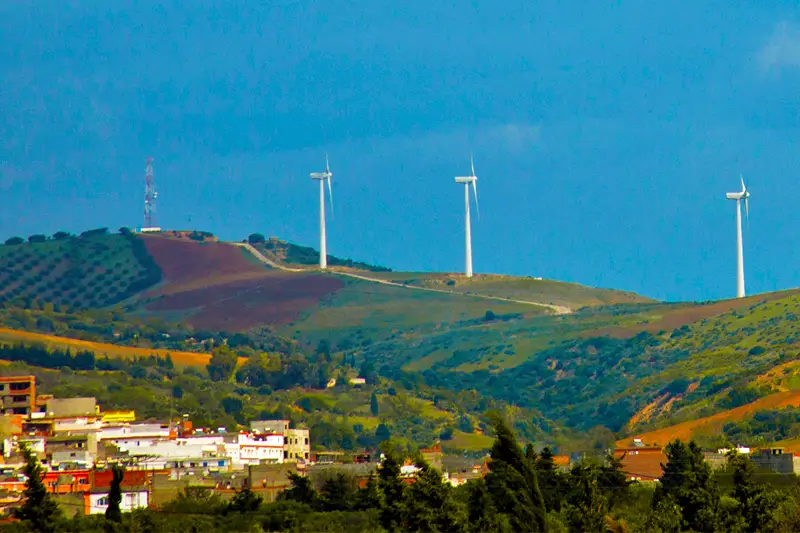Insights
Beyond Poles and Wires: Emerging Trends in Tunisia's Energy Sector
Tunisia has embarked on an impressive path toward renewable energy and energy efficiency. The Government released an update to the Tunisia Solar Plan in 2018— an ambitious roadmap for their energy sector—which calls for the acceleration of renewable energy projects by 2030. By then, Tunisia hopes to increase domestic electricity production from renewable energy sources to 30 percent, reduce energy demand by 30 percent, and lower carbon intensity across all sectors by 41 percent. These efforts are aimed at pushing Tunisia toward its climate goals and sustainable economic growth.
While Tunisia should be applauded for its ambitious goals, achieving these targets will be an uphill effort. Since 2010, according to the International Energy Agency’s World Energy Outlook 2020, Tunisia’s energy generation capacity has expanded only 3.6 percent annually, while electricity consumption has increased at a rate of 5 percent every year and is expected to double over the next 15 years from increased commercial, industrial, and residential demand. This creates a concerning gap between energy supply and demand.
In 2020, natural gas and heavy fuel oil accounted for 96 percent of primary energy consumption with 53 percent of this imported from Algeria. Consumption data was aggregated across commercial, industrial, and residential sectors (notably excluding transportation). Further, the World Bank reports the growing gap between domestic supply and demand is compounded through the existence of significant energy sector subsidies representing about 5 percent of GDP, creating a drain on public financial resources and promoting unsustainable energy consumption. Even a modest increase in generation capacity will create a considerable strain on the grid and consequently Tunisia’s national budget.
To examine these topics more in depth, RTI International recently hosted a discussion on emerging trends in Tunisia’s power sector and what they mean for the country moving forward. Highlights from this conversation, centered around two overarching themes—technology and finance—are summarized below.
Energy Technologies
Improved energy technologies on both the utility and customer sides of the meter can improve grid performance and increase economic prosperity throughout the energy industry.
Increased connectivity between grid assets through Internet of Things (IoT) technologies is a groundbreaking development for the sector. IoT can be leveraged to give operators real-time insights into the behavior of the grid through advanced sensors and software. The energy sector worldwide is benefiting from numerous new and affordable technologies that countries have not been able to fully optimize. IoT sensors and analytics have transformational ability to measure, monitor, and communicate and improve data-driven decision making for demand side management, including energy efficiency in buildings. In many cases, sensors are not being utilized to their full potential because of an overreliance on technologies alone.
Digitalization alone is not enough; to reap the benefits of new technologies, organizations should holistically consider people, process, and technology.
The people-process-technology framework recognizes that technology is merely a tool and without the right people and optimized processes in place, the desired outcome will not be achieved. For example, smart metering technologies can optimize the grid across the energy value chain by indicating power conditions and outages. This equips grid operators with actionable insights into grid conditions and enables more efficient resource allocation. Doing so is only possible if people are trained on the full spectrum of energy technologies and equipped with established tools to foster continuous learning and process improvement.
Energy Financing
Increasing the use of renewable energy is an ecological and economic, priority for Tunisia.
The World Bank estimates that $18 billion in new investments are needed to realize the goals of Tunisia’s Solar Plan, requiring a blended finance approach. Since 2017, renewable energy has experienced positive levels of interest from local, regional, and international investors, largely due to the regimes established by the Tunisian Solar Plan. Under the concession regime, Tunisia has been able to secure some of the lowest tariffs in Africa, attracting large investors with its competitive pricing
However, much more remains to be done on the commercial, regulatory, and political side so that investors and lenders can fully participate in the market. For instance, Tunisia needs commercial support to launch its private sector, including debt financing, investment funds, and technical assistance to improve the bankability of potential projects. International financial institutions, such as the U.S. International Development Finance Corporation, can fill this role. Tunisia should also prioritize establishing an energy regulatory authority to help enforce performance standards and strengthen the financial viability of the sector and address the governance challenges, political instability, and insufficient government commitments that are impeding private sector engagement. (Learn more about climate finance.)
Looking Forward to Renewable Energy in Tunisia
Tunisia has great potential for increased renewable energy generation and investment. While COVID-19 has inevitably impacted the country’s progress toward its goals, the panelists see great opportunities on the horizon. Implementing the recommendations described above—developing a regulatory body, creating frameworks to adopt and expand the use of technologies, and creating an enabling environment for investment— will strengthen the power sector and empower the Tunisian industry toward economic prosperity.
RTI International hosts events to engage in important international development discourse. The views of non-RTI presenters, speakers, and guests do not represent the views of RTI International.
Disclaimer: This piece was written by Amer Barghouth (Senior Research Energy Specialist), Verone Bernard (Urban Resilience Manager), and Ian McClenny (Energy Specialist) to share perspectives on a topic of interest. Expression of opinions within are those of the author or authors.




